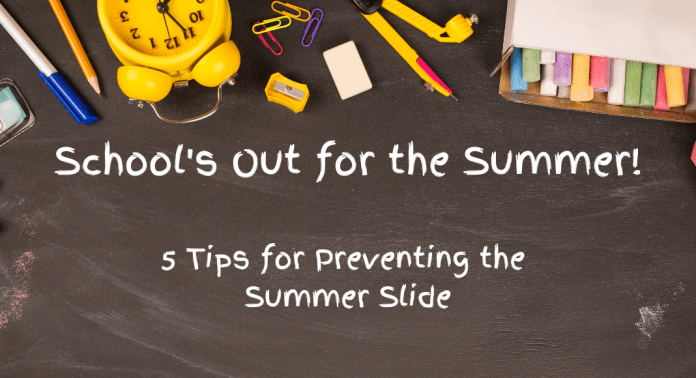The anticipation of summer and the end of the school year is near! The scents of sunscreen and bug spray are in the air and the excitement of a more flexible schedule lingers on the horizon. The sounds of summer abound as beach waves crash, mountain pines sway in the wind and the slapping of mosquitoes become the rhythm at outdoor BBQ’s. And then what was that? That last sound I hear? Oh yes, lest we forget the high-pitched whaling “Noooooooooo” coming from our children when we gingerly say, “You need to do a little school work today.” Sound familiar?
Once those classroom doors shut and the kids are free from school responsibility, why exactly do they need to practice their skills over the summer? Ever heard of the summer slide? That time when educators claim students can lose a certain skills and knowledge they gained during the school year? Turns out, it is not a claim at all. In fact, studies have shown that students can lose up to 20% of what they learned during the summer months with one article from Forbes claiming it can be upwards of 40%. So, what knowledge exactly are students losing and what makes them slide? To keep it simple – literacy and math skills. Reading comprehension and automaticity (how quickly and effortlessly students can figure out words) are two skills that students tend to perform lower on when they return to school in the fall.
According to idtech.com, about 2 months of reading skills and 2 ½ months of math skills are lost over a single summer. This statistic makes a lot of sense when you think about summer being 2 – 2 ½ months long. When acquired skills or knowledge are no longer practiced or applied we tend to either lose or weaken them. Reading is a actually a skill. It does not come naturally to 99% of learners. It has to be taught, practiced and repeated. If a student completely stops practicing what they learned over the course of a school year, they may not necessarily fall behind, but they are denying themselves the opportunity to remain on track or even get ahead. This same situation can be applied to adults. How many times have you signed up for a training, taken a class, enrolled in a specialty course or even spent hours on YouTube learning something new? How many of us apply what we learned, but only for a short amount of time and then either forget what to do or end up taking the class all over again? Skills must be practiced and remain consistent. This allows us to become better at them over time and reading is no different.
So, how do we keep our kids on track and tantrum free when it comes to the dreaded school “work” in the summer? Check out some tips below and you might be surprised how they relate to reading even when books are no where in sight!
- Try to keep a daily schedule: A lot of times, students get off their learning track over the summer because they are no longer in the same structured learning environment they are used to every day. When they arrive at school, they know exactly what to expect. It is important to continue this trend by letting your kids know what to expect almost every day. This does not mean every day has to be the same, but give your kids a heads up about what to expect this week, tomorrow and further into the summer. Maybe every Tuesday you go to the park, Wednesdays you go to the library, Thursdays are for errands and so on. You are not necessarily creating a schedule with dates and times, but you are providing some level of consistency.
- Sleep routine: During the summer months, kids may be getting less sleep due to longer days and different routines. Although it can be difficult and there is plenty of room for “off” days, try to keep a specific bedtime as much as possible. Children’s brains do not know that it is summer! Their minds still need rest, time to reenergize, rest and relax. Although kids’ batteries seemed charged more than ever during this time, they still need 9 – 12 hours of sleep each night depending on their age. Sleep is when the brain does a lot of its development. It is integral to the learning process. Also, keeping a consistent summer bedtime routine will make falling back into a regular school year routine a little easier.
- Quiet Time: A designated quiet time each day is when you will provide learning time for your child. This can look very different depending on your child and their needs, but at least 10-30 minutes a day is encouraged. Silent reading, reading out loud, reading to a sibling, taking turns reading with an adult, writing a letter, drawing a picture and writing about what they read, answering comprehension questions, retelling a story, and defining unknown words are all things that be accomplished during this time. “Quiet” simply means no distractions. It is intentional, uninterrupted time that your child can either work independently or with the guidance of an adult. This time is integral to preventing the summer slide! However, don’t panic if you go on vacation or miss a day here and there. Just try to be as consistent as possible.
- Disguise Learning: Weave learning into everyday tasks by timing how long it takes your child to make their bed, brush their teeth, get dressed, fill up a water bottle or set up a game. See if they can beat their time each day (while still brushing ALL of their teeth!). Have your kids cook with you so they can use measuring cups and spoons while learning to read a recipe. Play rhyming games for younger learners, such as “I spy something that rhymes with _____.” Or “I spy something that starts with the letter _____.” Read billboards (with caution!), street signs, cereal boxes, grocery labels, etc.
- PLAY! – Play, play, play! How does playing prevent the summer slide? As Mr. Rogers once said, “Play is often talked about as if it was a relief from serious learning, but for children, play is serious learning. Play is really the work of childhood.” Kids were born to play! At times, structured play and play based learning are needed to guide children through the learning process, but other times (most of the time), children need to engage in FREE play. They must let their imaginations take over, make things in their minds come to life, create an environment that they get drawn into for several minutes or even hours. Play is necessary for children to learn – especially outdoor play. Nature is the earth’s playground and provides healthy doses of developmental skills for all ages.
Lastly, limiting screen time and remaining as active as possible are two of the best ways to prevent the summer slide. Spending sedentary hours on any type of screen is not good for anyone’s brain – especially for children. A little time each day is fine when a short break from activity is needed, but keep your eye on the clock and set solid boundaries. Keeping things simple and fun will keep your child on track for the next school year. Now, let’s all slide into summer and enjoy the warmer days ahead!













